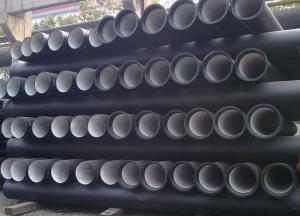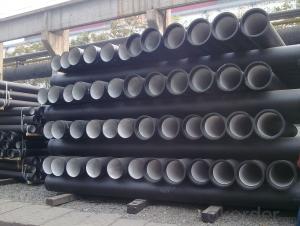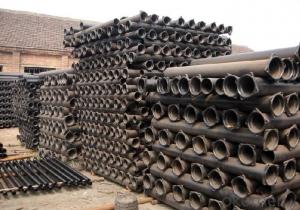Round Ductile Iron Pipe Supplier EN598 DN400 K9
- Loading Port:
- China main port
- Payment Terms:
- TT or LC
- Min Order Qty:
- 20 m.t.
- Supply Capability:
- 200000 m.t./month
OKorder Service Pledge
OKorder Financial Service
You Might Also Like
1. Ductile Iron Pipe Description :
We have passed ISO9001,ISO14001,OHSMS18001 certificate.
2. Main Features of the Ductile Iron Pipe:
1).Quality guarantee
• Chemical checking
• NDE after rough machining
• Mechanical testing after heat treatment
• Final NDE,dimension inspected
2).Quality document
• Full Q.A document as per client request
3).Packing and Shipping
• standard export package(carton/wooden case/pallet)
• accept FOB,FAS,CNF,CIF door to door etc or customer designated shipping agent
4).Service
• Drawing: we can translate your original drawing, offer best suggestion on design
• Quality: we have full set quality control system to guarantee the best quality.
• Inspection: inspect in house, all our products must be checked 3 times before packing
5)Inspection
• In-house Foundry
• Third party inspection available upon requirement
6) Our goal
• To be your preferred partner
3. Ductile Iron Pipe Images:
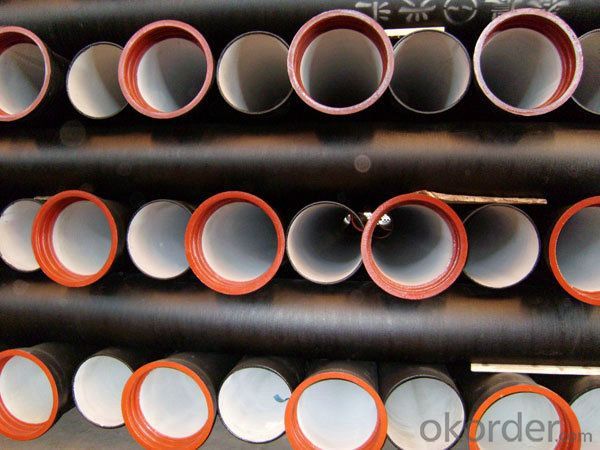
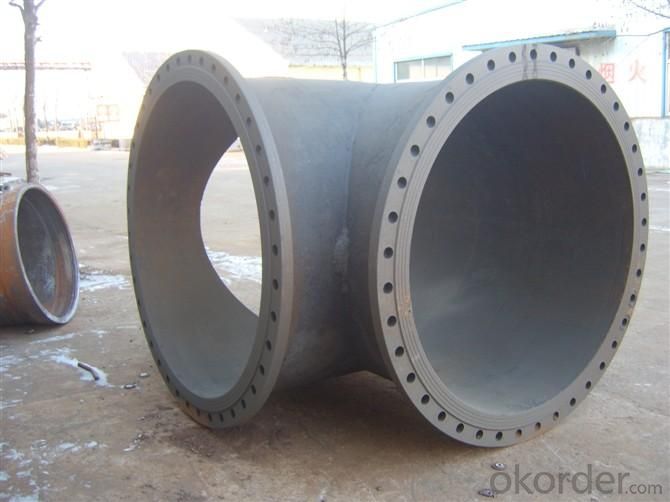
4. Ductile Iron Pipe Specification:
Quick Details
Place of Origin: China (Mainland)
Model Number: DN80-1600
Length: 6M/5.7M/NEGOTIATED
Standard: ISO2531 / EN545
Application: Potable/Sewage Water
Diameter: DN80-1600
Shape: Round
Hardness: 230
Pipe Wall Thickness: standerd
Pull Strength: 420
Yield (≥ MPa): 300
Material: Ductile Iron
water ductile iron pipe: SO2531 / EN545 DI pipe
5. FAQ:
1.Q: Why would you choose ductile iron pipe rather than other pipe materials?
A:The reasons are obvious for that not only ductile iron pipe possesses the inherent strength and flexibility of ductile iron, combined with proven corrosion protection systems, but also the cost savings can be achieved from design to installation and commissioning.
2.Q:Why can you guarantee the inner of pipes can’t be corroded?
A: High alumina cement mortar lining and sulphate-resistant cement mortar lining. These two special linings are applicable to inner anti-corrosion for sewage pipes, improving resistance to erosion of the sewage components.
- Q:What is the expected joint performance of ductile iron pipes?
- The expected joint performance of ductile iron pipes is generally considered to be excellent. Ductile iron pipes are known for their high durability and strength, making them suitable for various applications such as water distribution, sewer systems, and industrial pipelines. One of the key aspects of joint performance in ductile iron pipes is their ability to withstand external loads and pressure. The joints in ductile iron pipes are typically designed to provide a tight and secure connection, ensuring minimal leakage and long-term structural integrity. This is achieved through various joint types, including push-on joints, mechanical joints, and restrained joints. Push-on joints are commonly used in ductile iron pipes and allow for easy installation without the need for special tools or equipment. These joints utilize a rubber gasket that provides a watertight seal, preventing any leakage. Mechanical joints, on the other hand, involve the use of mechanical devices such as bolts and nuts to create a rigid connection between the pipes. This type of joint provides additional strength and resistance against external forces. In terms of performance, ductile iron pipes have been extensively tested and proven to meet or exceed industry standards for pressure and bending strength. They have high resistance to corrosion, which ensures a long service life, and are also less susceptible to damage from ground movements or vibrations. These properties contribute to the overall joint performance of ductile iron pipes, ensuring reliable and efficient operation in various infrastructure systems. Overall, when installed and maintained properly, ductile iron pipes exhibit excellent joint performance, providing a reliable and durable solution for various applications in the water and wastewater industry.
- Q:How much is the manual installation fee of ductile iron pipes from 100 to 150 per metre?
- Upstairs said 9 yuan per meter, about the same, if you use the special (ductile iron pipe installation tool) construction greatly saves the labor cost, very fast and convenient, can search, is a special tool for the new, I hope to help you.
- Q:Are ductile iron pipes suitable for pressure reducing valve stations?
- Yes, ductile iron pipes are suitable for pressure reducing valve stations. Ductile iron pipes are known for their strength and durability, which makes them an ideal choice for applications involving high pressure. Pressure reducing valve stations are designed to regulate and reduce the pressure of a fluid or gas in a pipeline system. Ductile iron pipes can handle the pressure exerted by the fluid or gas, ensuring a reliable and efficient operation of the pressure reducing valve station. Additionally, ductile iron pipes have excellent resistance to corrosion, which is crucial in maintaining the integrity of the pipeline system and preventing leaks or failures. Overall, ductile iron pipes provide the necessary strength, durability, and corrosion resistance required for pressure reducing valve stations.
- Q:Does centrifugal cast iron pipe work well with lining cement? Will it scale and breed bacteria?
- Poor hydraulic performance and high energy consumption. The roughness coefficient of the prestressed reinforced concrete pipe is between 0.013 - 0.014, so that the pipeline resistance of the pipeline with the same pipe diameter is higher than that of the same water content. Because of its high roughness, after a period of use, the pipeline will be blocked by bacteria, shellfish breeding and reproduction. As the service life increases, the inner diameter of the pipe will gradually shrink and the resistance will increase.
- Q:How are ductile iron pipes made?
- The manufacturing of ductile iron pipes involves a specific process called centrifugal casting. In this process, molten iron is poured into a rotating mold, typically made of steel. The rotation of the mold creates centrifugal force, which evenly distributes the molten iron, resulting in high-quality pipes. To start the manufacturing process, a mixture of scrap iron, steel, and recycled material is melted at extremely high temperatures in a furnace. Once the molten iron reaches the desired temperature and consistency, it is ready to be cast into pipes. To prevent the molten iron from cooling too quickly, the rotating mold is preheated. This preheating also contributes to achieving a smooth surface finish on the pipes. The molten iron is then poured into the rotating mold through a central sprue. As the mold spins, centrifugal force forces the molten iron against the inner walls of the mold. This rapid solidification results in dense, strong, and corrosion-resistant pipes. The centrifugal force also helps remove impurities or slag from the inner surface of the pipe, further enhancing its quality. Once the casting process is complete, the mold is allowed to cool, and the pipe is removed. The pipes undergo various tests to ensure they meet the required quality standards. These tests include checking dimensions, mechanical properties, and surface finish. After passing the quality tests, ductile iron pipes are typically coated with a protective lining to prevent corrosion and extend their lifespan. The type of lining used, such as cement mortar, epoxy, or polyethylene, depends on the intended application of the pipes. In conclusion, the centrifugal casting process is utilized to manufacture ductile iron pipes. This process ensures the production of high-quality pipes that are strong, corrosion-resistant, and have a smooth surface finish.
- Q:Can ductile iron pipes be used for underground sewage systems?
- Underground sewage systems can utilize ductile iron pipes, which offer numerous advantages. Ductile iron is a form of cast iron that possesses improved flexibility and strength, making it suitable for a variety of applications, including sewage systems. The first advantage of ductile iron pipes for underground sewage systems is their exceptional resistance to corrosion. This is particularly important in sewage systems where moisture and chemicals can contribute to corrosion over time. By resisting corrosion, these pipes ensure long-term durability and reliability. Additionally, ductile iron pipes possess high tensile strength, enabling them to withstand the pressure and stress that occur in underground sewage systems. They are also capable of withstanding ground movements, such as soil settling or shifting, which can cause damage to pipes made from other materials. Moreover, ductile iron pipes have a smooth internal surface, resulting in improved flow capacity and reducing the likelihood of clogging or blockages in the sewage system. This smooth surface also minimizes the accumulation of debris and sediment, lessening the need for frequent maintenance and cleaning. Another significant aspect is that ductile iron pipes are available in various sizes and can be easily connected using a range of joint systems. This allows for flexibility when designing and constructing underground sewage systems. In conclusion, ductile iron pipes are an excellent choice for underground sewage systems due to their corrosion resistance, high tensile strength, smooth internal surface, and ease of installation.
- Q:How are ductile iron pipes protected against internal scaling or buildup?
- Various methods are utilized to protect ductile iron pipes against internal scaling or buildup. One widely employed technique involves applying a cement mortar lining to the inner surface of the pipes. This lining serves as a protective barrier, preventing the formation of scale or buildup and facilitating the smooth flow of water or other fluids. Moreover, an additional layer of polyethylene or other appropriate materials can be coated onto the pipes to provide an extra level of protection against scaling or buildup. This coating acts as a barrier between the water and the iron surface, thereby reducing the likelihood of corrosion or scale formation. Regular maintenance and cleaning play a crucial role in preventing internal scaling or buildup in ductile iron pipes. By flushing the pipes with high-pressure water or employing chemical treatments, any accumulated scale or debris can be effectively removed, ensuring the pipes remain clean and fully functional. Furthermore, proper water treatment is essential in minimizing the risk of scaling or buildup. By implementing suitable water treatment processes, such as pH adjustment or the use of corrosion inhibitors, the quality of the water can be maintained, preventing the formation of scale or buildup inside the pipes. In conclusion, various measures, including cement mortar lining, pipe coating, regular maintenance, cleaning, and proper water treatment, are employed to protect ductile iron pipes against internal scaling or buildup. These measures ensure the longevity and efficiency of the pipes, minimizing the chances of clogging or reduced flow capacity.
- Q:How does ductile iron pipe resist internal corrosion?
- The resistance of ductile iron pipe to internal corrosion is achieved through a combination of distinct material properties and the use of protective coatings. To start, ductile iron, also known as nodular cast iron, is created by incorporating magnesium into molten iron, resulting in a graphite structure that is nodular or spherical in shape. This unique structure enhances the material's flexibility and elasticity, reducing the likelihood of cracking or fracturing when subjected to stress. Moreover, ductile iron possesses a dense microstructure with a high carbon content, serving as a barrier that prevents corrosive elements from penetrating the surface of the pipe. This inherent resistance to corrosion makes ductile iron pipe suitable for transporting various fluids, including water, sewage, and chemicals, without the risk of deterioration over time. Additionally, ductile iron pipes are often lined with protective coatings internally, further augmenting their resistance to corrosion. These coatings, such as cement mortar or epoxy, form a barrier between the pipe's surface and the fluid it carries, minimizing direct contact and decreasing the likelihood of corrosion. These linings are implemented during the manufacturing process, ensuring consistent and durable protection along the entire length of the pipe. In conclusion, ductile iron pipe successfully resists internal corrosion due to its material composition, including the nodular graphite structure and high carbon content, as well as the application of protective coatings. This combination of factors guarantees the longevity and dependability of ductile iron pipes in various applications, even in environments prone to corrosion.
- Q:Can ductile iron pipes be used for mining applications?
- Mining applications can indeed utilize ductile iron pipes. These pipes possess exceptional mechanical properties, including high tensile strength, impact resistance, and durability. As a result, they are well-suited for a range of challenging environments, including mining operations. The pipes are capable of withstanding substantial loads and pressures, making them ideal for the transportation of water, slurry, and other fluids utilized in mining processes. Moreover, ductile iron pipes have a smooth internal surface that minimizes friction and promotes the efficient flow of materials. Consequently, they find extensive use in tasks such as dewatering, tailings disposal, and the transport of corrosive or abrasive substances within the mining industry. Overall, due to their strength, durability, and suitability for demanding conditions, ductile iron pipes offer a dependable and cost-effective choice for mining applications.
- Q:What is the expected pressure rating for ductile iron pipes?
- The pressure rating for ductile iron pipes can differ based on factors like pipe diameter, wall thickness, and specific application. In general, ductile iron pipes are built to endure high-pressure situations. They are frequently utilized in water and wastewater systems, where they can normally manage pressures ranging from 150 psi to 350 psi or more. To ensure safe and dependable operation, it is crucial to refer to the manufacturer's specifications or relevant industry standards for precise pressure ratings based on pipe size and application.
1. Manufacturer Overview |
|
|---|---|
| Location | |
| Year Established | |
| Annual Output Value | |
| Main Markets | |
| Company Certifications | |
2. Manufacturer Certificates |
|
|---|---|
| a) Certification Name | |
| Range | |
| Reference | |
| Validity Period | |
3. Manufacturer Capability |
|
|---|---|
| a)Trade Capacity | |
| Nearest Port | |
| Export Percentage | |
| No.of Employees in Trade Department | |
| Language Spoken: | |
| b)Factory Information | |
| Factory Size: | |
| No. of Production Lines | |
| Contract Manufacturing | |
| Product Price Range | |
Send your message to us
Round Ductile Iron Pipe Supplier EN598 DN400 K9
- Loading Port:
- China main port
- Payment Terms:
- TT or LC
- Min Order Qty:
- 20 m.t.
- Supply Capability:
- 200000 m.t./month
OKorder Service Pledge
OKorder Financial Service
Similar products
New products
Hot products
Hot Searches
Related keywords
